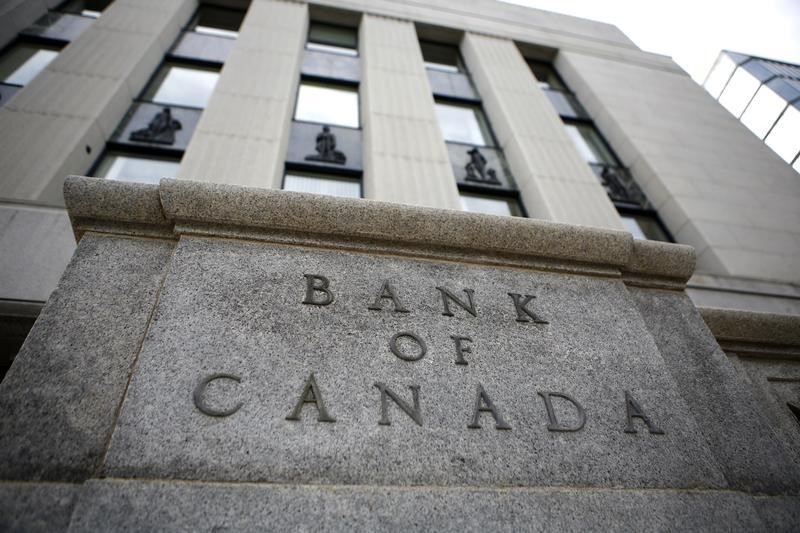(Adds governor's comments from press conference)
OTTAWA, Oct 21 (Reuters) - The housing market and debt
levels should stabilize as the economy gains strength, the Bank
of Canada said on Wednesday, even as it noted lower mortgage
rates are fueling borrowing, especially in Ontario and British
Columbia.
As part of its Monetary Policy Report, the central bank
noted that housing market activity in commodity-sensitive
provinces was weakening, but has stayed strong on the West Coast
and Ontario, while activity in the rest of the country was soft.
The lower cost of debt is also supporting other forms of
consumer credit growth and spending, with consumption resilient
despite the hit to incomes from lower commodity prices, the bank
said. Canadians' debt-to-income ratio is at a record high.
After the bank cut interest rates twice this year, one of
the concerns from observers has been the possible overheating of
the housing market, particularly in Toronto and Vancouver.
While there's no question that the vulnerabilities in the
household sector continue to edge higher, that is a rational
response to low rates and is evolving as expected, Bank of
Canada Governor Stephen Poloz told reporters.
At the same time, the policy actions taken by the bank have
helped bring about an economic turnaround in the second-half, he
said.
"What's at work there is that we're reducing the odds of
there being a trigger to cause those vulnerabilities to manifest
themselves as risk," Poloz said.
Poloz also pointed to a strong underwriting culture in
Canada's financial system, which it benefited from during the
global credit crisis in 2008-09.
The bank said it expects the housing market and household
indebtedness will stabilize over the next two years as the
economy recovers momentum and as household borrowing rates start
to normalize.
Still, the bank warned that if there were a disorderly
unwinding of imbalances in the household sector - for example,
from further resource weakness or a rapid rise in global
interest rates - there could be "sizable negative effects" on
the economy.
- English (USA)
- English (UK)
- English (India)
- English (Australia)
- English (South Africa)
- English (Philippines)
- English (Nigeria)
- Deutsch
- Español (España)
- Español (México)
- Français
- Italiano
- Nederlands
- Português (Portugal)
- Polski
- Português (Brasil)
- Русский
- Türkçe
- العربية
- Ελληνικά
- Svenska
- Suomi
- עברית
- 日本語
- 한국어
- 简体中文
- 繁體中文
- Bahasa Indonesia
- Bahasa Melayu
- ไทย
- Tiếng Việt
- हिंदी
UPDATE 1-Bank of Canada sees debt levels stabilizing as economy improves
Published 2015-10-21, 12:50 p/m
UPDATE 1-Bank of Canada sees debt levels stabilizing as economy improves

Latest comments
Install Our App
Risk Disclosure: Trading in financial instruments and/or cryptocurrencies involves high risks including the risk of losing some, or all, of your investment amount, and may not be suitable for all investors. Prices of cryptocurrencies are extremely volatile and may be affected by external factors such as financial, regulatory or political events. Trading on margin increases the financial risks.
Before deciding to trade in financial instrument or cryptocurrencies you should be fully informed of the risks and costs associated with trading the financial markets, carefully consider your investment objectives, level of experience, and risk appetite, and seek professional advice where needed.
Fusion Media would like to remind you that the data contained in this website is not necessarily real-time nor accurate. The data and prices on the website are not necessarily provided by any market or exchange, but may be provided by market makers, and so prices may not be accurate and may differ from the actual price at any given market, meaning prices are indicative and not appropriate for trading purposes. Fusion Media and any provider of the data contained in this website will not accept liability for any loss or damage as a result of your trading, or your reliance on the information contained within this website.
It is prohibited to use, store, reproduce, display, modify, transmit or distribute the data contained in this website without the explicit prior written permission of Fusion Media and/or the data provider. All intellectual property rights are reserved by the providers and/or the exchange providing the data contained in this website.
Fusion Media may be compensated by the advertisers that appear on the website, based on your interaction with the advertisements or advertisers.
Before deciding to trade in financial instrument or cryptocurrencies you should be fully informed of the risks and costs associated with trading the financial markets, carefully consider your investment objectives, level of experience, and risk appetite, and seek professional advice where needed.
Fusion Media would like to remind you that the data contained in this website is not necessarily real-time nor accurate. The data and prices on the website are not necessarily provided by any market or exchange, but may be provided by market makers, and so prices may not be accurate and may differ from the actual price at any given market, meaning prices are indicative and not appropriate for trading purposes. Fusion Media and any provider of the data contained in this website will not accept liability for any loss or damage as a result of your trading, or your reliance on the information contained within this website.
It is prohibited to use, store, reproduce, display, modify, transmit or distribute the data contained in this website without the explicit prior written permission of Fusion Media and/or the data provider. All intellectual property rights are reserved by the providers and/or the exchange providing the data contained in this website.
Fusion Media may be compensated by the advertisers that appear on the website, based on your interaction with the advertisements or advertisers.
© 2007-2025 - Fusion Media Limited. All Rights Reserved.